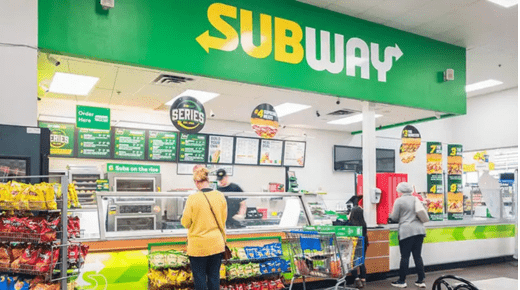Subway is one of the most recognized and successful fast-food franchises in the world. With its unique approach to providing fresh, customizable sandwiches and salads, Subway has earned a loyal customer base across the globe. For entrepreneurs interested in opening their own business, a subway franchise offers a great opportunity. If you’re considering joining this iconic brand, understanding the costs, benefits, and steps to success is essential. In this article, we’ll explore everything you need to know about owning a Subway franchise.
Why Choose a Subway Franchise?
Subway has built a reputation for offering quality, healthier fast food options, and its franchise model is one of the most successful in the industry. Here are some reasons why a Subway franchise could be the right investment for you:
- Global Brand Recognition: Subway is known worldwide, with over 37,000 locations in more than 100 countries. Its strong brand recognition can help attract customers to your store, providing a solid foundation for a successful business.
- Health-Conscious Menu: Subway’s menu focuses on providing fresh, customizable options that cater to a health-conscious audience. With low-calorie options, vegetarian meals, and gluten-free choices, Subway appeals to a broad range of customers looking for nutritious, tasty meals.
- Proven Business Model: Subway has a tried-and-tested business model that has been honed over decades. The franchise offers a turnkey system, which means you’ll receive extensive support, training, and resources to help you operate your restaurant successfully.
- Flexible Store Formats: Subway franchises come in various formats, including traditional locations, food courts, and non-traditional locations like airports, shopping malls, and convenience stores. This flexibility allows you to choose a location that suits your budget and business goals.
- Comprehensive Support: As a franchisee, you’ll have access to Subway’s extensive support network, including training, marketing, and operational assistance. Subway’s ongoing support ensures that you have the resources and knowledge you need to run a successful business.
How Much Does a Subway Franchise Cost?
Before you can open a Subway franchise, it’s important to understand the costs involved. The total investment required to open a Subway franchise can vary depending on several factors, such as location, size, and leasehold improvements. Here’s a breakdown of the costs involved in opening a Subway franchise:
- Franchise Fee: The initial franchise fee for a Subway franchise is $15,000. This one-time fee grants you the right to use Subway’s brand, operating systems, and support services. The franchise fee is non-refundable, but it provides you with the opportunity to operate a business under a globally recognized brand.
- Initial Investment: The total initial investment to open a Subway franchise can range from $150,000 to $300,000. This includes the franchise fee, leasehold improvements (construction or renovation of the restaurant space), equipment, signage, and initial inventory. The costs can vary depending on the location and size of the store.
- Leasehold Improvements: If the location requires construction or renovation, this can cost between $50,000 and $150,000, depending on the scope of the project.
- Equipment: Subway provides a list of required equipment, including refrigerators, ovens, and food preparation stations. The cost for purchasing equipment typically ranges from $30,000 to $60,000.
- Initial Inventory: You’ll need to stock up on inventory, including food products, packaging, and other operational supplies. The cost for initial inventory generally ranges from $3,000 to $10,000.
- Ongoing Fees: In addition to the initial investment, Subway franchisees are required to pay ongoing fees:
- Royalty Fee: Subway charges an 8% royalty fee based on your store’s gross sales. This fee helps support Subway’s global operations, marketing campaigns, and ongoing franchisee support.
- Advertising Fee: Franchisees must contribute to a national advertising fund, which is typically 4.5% of gross sales. This fund is used to promote the Subway brand on a national and regional level.
- Other Operating Costs: You’ll also need to budget for regular operating costs, including rent, utilities, employee wages, and inventory replenishment.
The Franchise Application Process
Becoming a Subway franchisee is a step-by-step process that begins with submitting an online application. Here’s a brief overview of the steps involved:
- Submit an Application: The first step in opening a Subway franchise is submitting an online application. This includes providing personal details, financial information, and your business experience. Subway will review your application to determine if you meet their qualifications.
- Review the Franchise Disclosure Document (FDD): If your application is approved, you’ll receive a Franchise Disclosure Document (FDD), which outlines the franchise agreement, fees, and other important details about owning a Subway franchise. It’s crucial to carefully review this document before proceeding.
- Training and Support: After signing the franchise agreement, you’ll undergo comprehensive training. Subway provides an initial training program that covers everything from store operations to customer service. You’ll also receive ongoing support to help you manage your business.
- Site Selection: Subway will assist you in selecting a location for your franchise. This includes helping you find a suitable site, negotiating leases, and ensuring that the location meets Subway’s requirements.
- Store Setup: Once a location is secured, you’ll begin setting up your store. Subway provides guidelines for store design, layout, and equipment setup to ensure that your location meets the company’s standards.
Potential Earnings and Return on Investment
The potential earnings from a Subway franchise can vary based on factors such as location, sales volume, and operating costs. On average, Subway locations generate between $400,000 and $500,000 in annual sales. However, profitability depends on the effectiveness of your management, customer service, and marketing efforts.
The return on investment (ROI) will depend on your ability to control costs and drive sales. With the right location, strong operational practices, and consistent customer service, many franchisees achieve profitability within a few years of opening their Subway restaurant.
Conclusion
Owning a Subway franchise can be a rewarding and profitable business venture for aspiring entrepreneurs. While the initial investment can range from $150,000 to $300,000, Subway’s proven business model, global brand recognition, and ongoing support make it a viable option for those looking to enter the fast-food industry.
If you’re ready to take the next step and become a part of the Subway family, it’s important to thoroughly research the costs, fees, and processes involved. With proper planning, dedication, and the right location, owning a Subway franchise could provide you with long-term success and financial rewards.









